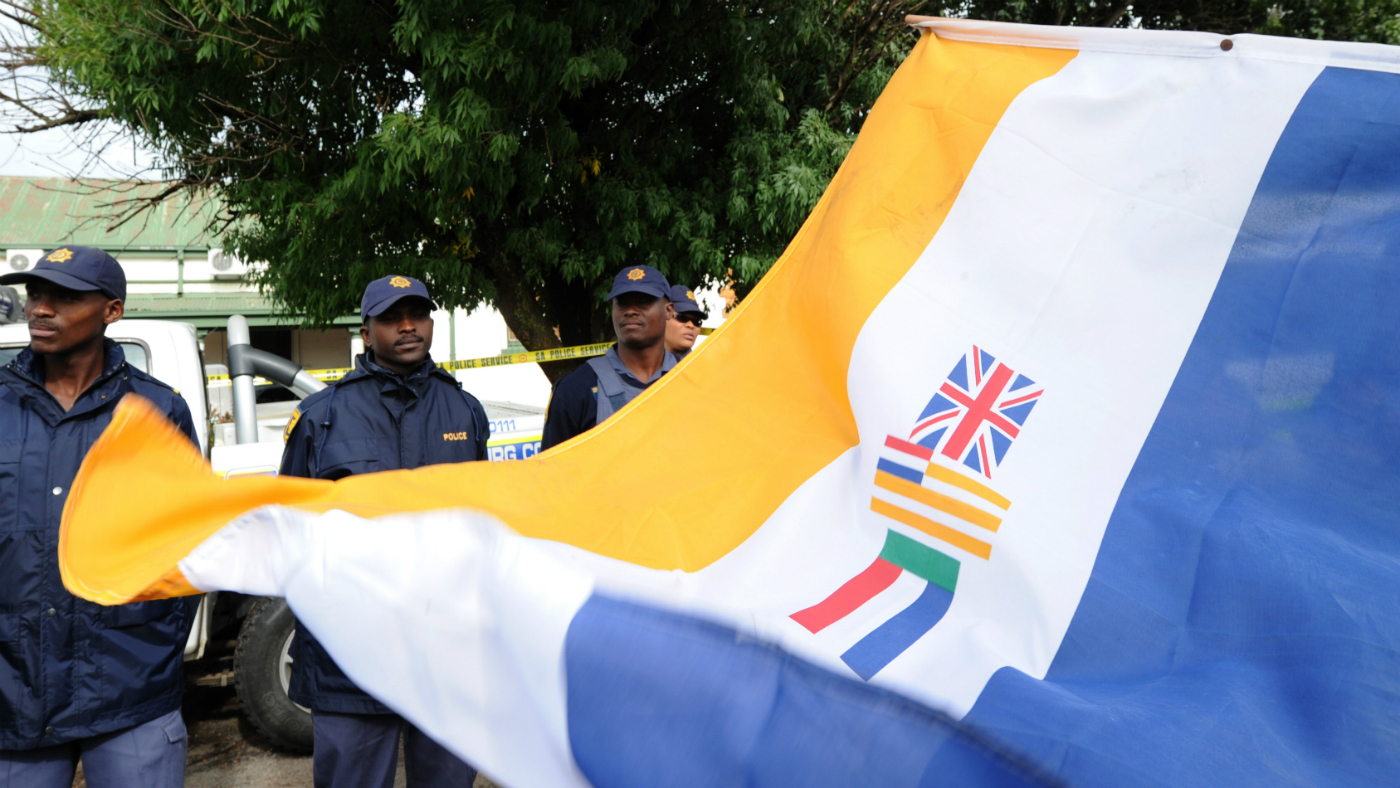South Africans call for apartheid flag ban
Critics say it is a painful reminder of white minority rule, but some argue it's a symbol of Afrikaner heritage

A free daily email with the biggest news stories of the day – and the best features from TheWeek.com
You are now subscribed
Your newsletter sign-up was successful
The display of apartheid-era flags at recent protests in South Africa has led to fresh calls for the symbol to banned.
The old flag, officially retired when white minority rule ended and the first democratic elections were held in 1994, was brandished by some protesters at a march against farm murders on Monday.
The controversial demonstration was called after the murder last week of a white farmer in Klapmuts, a town in the Western Cape, Al Jazeera reports.
The Week
Escape your echo chamber. Get the facts behind the news, plus analysis from multiple perspectives.

Sign up for The Week's Free Newsletters
From our morning news briefing to a weekly Good News Newsletter, get the best of The Week delivered directly to your inbox.
From our morning news briefing to a weekly Good News Newsletter, get the best of The Week delivered directly to your inbox.
Hundreds of mostly white protesters took to the streets in a campaign dubbed Black Monday, blocking a major highway to Johannesburg.
Many on social media found the protest offensive, “not least because the flag is widely considered a painful symbol of apartheid”, Garreth Van Niekerk argues in Huffington Post South Africa.
“Comparisons have been drawn between the orange, white and blue one and the Nazi flag, and there have been calls that displaying it should be made illegal,” he adds.
Van Niekerk points out that the flag has been adopted by white supremacist groups around the world and was worn by Dylann Roof, a white man who killed nine black churchgoers in South Carolina in 2015.
A free daily email with the biggest news stories of the day – and the best features from TheWeek.com
However, some South Africans argue that the flag is an important symbol of Afrikaner heritage and history, he says.
In a statement, the ruling African National Congress condemned the “despicable” and “racist” behaviour displayed at this week’s protest.
“The racial characterisation of crime and the stoking of racial hatred by some elements in the campaign through, among others, the arrogant and offensive display of apartheid South Africa’s flag, are indicative of an unrelenting yearning for apartheid fascism and while supremacy,” it said.
-
 Key Bangladesh election returns old guard to power
Key Bangladesh election returns old guard to powerSpeed Read The Bangladesh Nationalist Party claimed a decisive victory
-
 Judge blocks Hegseth from punishing Kelly over video
Judge blocks Hegseth from punishing Kelly over videoSpeed Read Defense Secretary Pete Hegseth pushed for the senator to be demoted over a video in which he reminds military officials they should refuse illegal orders
-
 Trump’s EPA kills legal basis for federal climate policy
Trump’s EPA kills legal basis for federal climate policySpeed Read The government’s authority to regulate several planet-warming pollutants has been repealed
-
 Epstein files topple law CEO, roil UK government
Epstein files topple law CEO, roil UK governmentSpeed Read Peter Mandelson, Britain’s former ambassador to the US, is caught up in the scandal
-
 Iran and US prepare to meet after skirmishes
Iran and US prepare to meet after skirmishesSpeed Read The incident comes amid heightened tensions in the Middle East
-
 Israel retrieves final hostage’s body from Gaza
Israel retrieves final hostage’s body from GazaSpeed Read The 24-year-old police officer was killed during the initial Hamas attack
-
 China’s Xi targets top general in growing purge
China’s Xi targets top general in growing purgeSpeed Read Zhang Youxia is being investigated over ‘grave violations’ of the law
-
 Panama and Canada are negotiating over a crucial copper mine
Panama and Canada are negotiating over a crucial copper mineIn the Spotlight Panama is set to make a final decision on the mine this summer
-
 Why Greenland’s natural resources are nearly impossible to mine
Why Greenland’s natural resources are nearly impossible to mineThe Explainer The country’s natural landscape makes the task extremely difficult
-
 Iran cuts internet as protests escalate
Iran cuts internet as protests escalateSpeed Reada Government buildings across the country have been set on fire
-
 US nabs ‘shadow’ tanker claimed by Russia
US nabs ‘shadow’ tanker claimed by RussiaSpeed Read The ship was one of two vessels seized by the US military